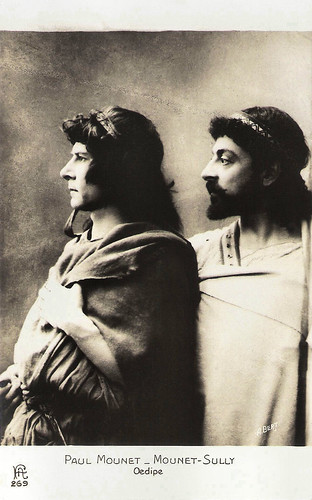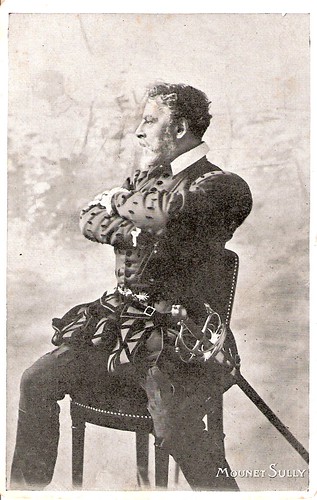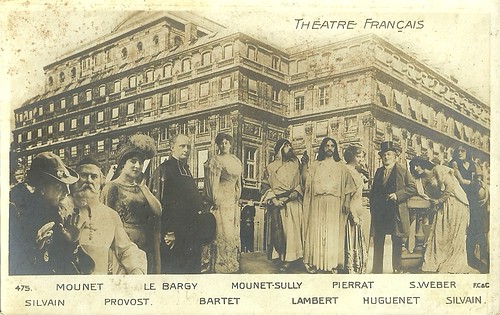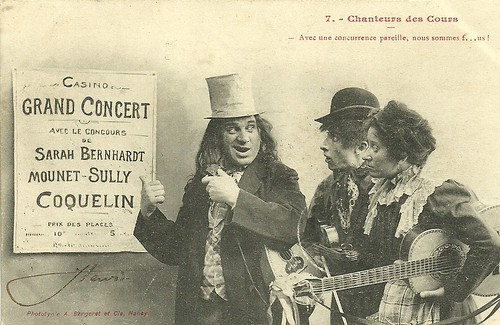
French postcard by A.N. (Noyer), Paris, no. 70. Photo: Etienne Carjat, 1860s.

French postcard. Photo: Boyer, Paris. Caption: Mounet-Sully de la Comédie-Française. Mounet-Sully as Othello, which he first performed in 1899. Jean Aicard had translated Shakespeare's text into French, in close collaboration with Mounet-Sully.

French minicard (collector card) in the Collection Félix Potin, series 1 (c. 1900). Photo: Nadar, Paris.

French postcard by F.A., printed by A. Christensen, imp, Rueil, no. 269. Photo: A. Bert. Paul Mounet and Mounet-Sully in the stage play 'Oedipe Roi' (Oedipus Rex) by Sophocles at the Comédie-Française in 1892.

French postcard. Mounet-Sully in the play 'Patrie!' by Victorien Sardou.

French postcard by P.A., no. 48 Photo: A. Bert.
Striking presence, voice and vigorous acting
Mounet-Sully was born as Jean-Sully Mounet in Bergerac in the Dordogne, France, in 1841.
He had his dramatic training at the Conservatoire in Paris, which he entered at the age of twenty-one. At the Conservatoire, he took the first prize for tragedy. He made his stage debut at the Odeon Theatre in 1868 without attracting much attention. His career was interrupted by the Franco-Prussian War of 1870-1871, and his passion for his military career almost convinced him to give up his stage career.
In 1872, he had his breakthrough when he could play Oreste in Jean Racine's 'Andromaque' at the Comédie-Française. In the following years, his striking presence, voice and vigorous acting made him one of the most important actors of the Comédie-Française. He played the great roles of the classic repertory, including Achilles in Jean Racine's 'Iphigenie et Aulide', Rodrigue in 'Le Cid', Nero in 'Britannicus', Hippolyte in 'Phèdre' and the title parts in Victor Hugo's 'Hernani' and 'Ruy Blas'.
He reached his apex in 1881 with the première of 'Oedipe roi', a French version by Jules Lacroix of Sophocles' drama 'Oedipus Rex'. Mounet-Sully was innovating in thinking that an actor should lose his own personality and totally absorb that of his character once on stage.
Another triumph for Mounet-Sully was his Hamlet in the play by William Shakespeare in 1886. He was made a Chevalier of the Legion of Honour in 1889.

French postcard. Paul Mounet and Mounet-Sully in 'Ruy Blas' by Victor Hugo at the Comédie-Française.

French postcard by L'H, Paris. Jean Mounet-Sully as the Count of Rysoor in the French stage play 'Patrie!' by Victorien Sardou, performed in Paris in 1901 at the Comédie-Française.

French postcard, no. 26. Théâtre Antique d'Orange, August 1910. Group of artistic personalities. Left to right: Albert Lambert, Aimée Tessandier, Georges Rivollet (auteur of 'Alkestis', 1899), Yvonne Boucher, Balcourt (souffleur), Jeanne Rémy, Madeleine Roch, Boucher (director), Morcan, Jean Mounet-Sully, Petit, Marc Gérard. Rivollet reworked 'Alkestis' by Euripides. Lambert had played Herakles's lead in 'Alkestis' in 1900 in Paris, while Paul Mounet, Mounet-Sully's elder brother, had played it at its premiere in 1899 at the Theatre d'Orange.

French postcard by F.C. & Cie., Paris, no. 475. This card shows a 1920s photo montage of the actors of the Comédie Française, partly dressed in the costumes of their most famous plays. In the back, the Théàtre Français, home of the Comédie. From left to right: (Eugène) Silvain/Sylvain, Paul Mounet, Jeanne Provost, Charles Le Bargy, Julia Bartet, Jean Mounet-Sully, Albert Lambert, Marie-Thérèse Piérat, Huguenet, Ségond-Weber, Louise Silvain. Almost all of these actors also had a film career, either in the Film d'art films of the early 1910s or at later stages. Mounet-Sully and Albert Lambert wear their costumes from the film Le baiser de Judas.

French postcard by CCCC (Charles Collas & Compagnie, Cognac) / M.T.I.L., Limoges. Jean Mounet-Sully as Oedipus in Sophocles' tragedy 'Oedipe-roi' (Oedipus Rex), Theatre de la Nature, Périgeux, July 1907. Act 2, Oedipus threatens Tiresias. Paul Mounet played Tiresias.
Film d'art cinema
Jean Mounet-Sully was also a film actor during the short French 'wave' of the film d'art cinema. Unfortunately, most of Mounet-Sully's films are lost. While there is uncertainty about the release of a film after his stage success Oedipe-roi / Oedipus Rex in 1908 or 1909, directed by André Calmettes, he played the title role opposite Albert Lambert as Jesus in Le baiser de Judas / The Judas Kiss (1908), a Film d'Art production by André Calmettes and Armand Bour. Recently, a nitrate of the film has been found, but the film still awaits preservation.
Mounet-Sully did three more films for Film d'Art. Also in 1908, Mounet-Sully acted opposite Madeleine Roch and Gabrielle Réjane in Britannicus (André Calmettes, 1908). In 1909, he acted opposite Louise Silvain in Une scène d’Andromaque à la Comédie-Française / A Scene from Andromache at the Comédie-Française (André Calmettes, 1909), and in one act - The Gravediggers - of William Shakespeare's Hamlet (André Calmettes, 1908).
His final film was another adaptation of Sophocles' play, La légende d'Oedipe / Oedipus Rex (Gaston Roudès, 1912) for Eclipse. His younger brother Paul Mounet, Jeanne Delvair and Joë Hamman also acted in this film. Mounet-Sully's companion, Jeanne Rémy and their daughter, Jeanne Sully, played minor parts in the film.
When the First World War broke out and many actors were mobilised, Mounet-Sully defended the interests of his Comédie-Française, where he had been a Doyen (dean) since 1894. Although he was over seventy years old, he still played at the Comédie-Française from time to time. In 1915, he played his last role, his former success 'Polyeucte'.
Jean Mounet-Sully died in 1916 in Paris. He was 75. At his death, Pathé made a homage to him with some newsreel footage and clips from Hamlet and possibly Une scène d’Andromaque à la Comédie-Française. A Pathé Baby film of this homage still exists. Mounet-Sully was a good friend, co-performer, and one-time lover of legendary actress Sarah Bernhardt.

French postcard by F.C. & Cie., no. 408. Photo A. Bert, Paris. Jean Mounet-Sully as Hamlet, which he probably played for the first time in 1886 at the Comédie-Française. He reprised the part in 1904, this time with his brother Paul as The Ghost.

French postcard by PA, no. 276. Photo: A. Bert.

French postcard by F.C. & C, no. 83. Photo: Paul Boyer. Jean Mounet-Sully in the Greek tragedy 'Oedipe', probably 'Oedipe-roi / Oedipus Rex' by Sophocles. Mount-Sully acted Oedipus countless times, in the French adaptation by Jules Lacroix, and this from 1881 onward. In 1912 also acted the role in an early film version, Œdipe-roi / La Légende d'Œdipe, directed by Gaston Roudès for the company Eclipse.

French postcard by A.B. Photo: Mounet-Sully in the play 'Oedipe Roi' (Oedipus Rex) by Sophocles.

French still. Oedipus (Jean Mounet-Sully) and Tiresias (Paul Mounet) in the lost film La légende d'Oedipe / Oedipus Rex (Gaston Roudès, Eclipse 1912). Mounet-Sully probably acted in an earlier version, filmed by André Calmettes for Film d'Art in 1908 or 1909, entitled Oedipe-roi, of which less than a minute survives. It can be viewed on a DVD attached to the publication 'De la scène à la pellicule. Théâtre, musique et cinéma autour de 1900' (2021), edited by Rémy Campos, Alain Carou and Aurélien Poidevin.

French postcard in the series Chanteurs des Cours, no. 7. Photo: A. Bergeret & Co., Nancy. Caption: "Avec une concurrence pareille, nous sommes f....us!" (With such a competition, we are lost!)
This postcard is from a caricature series on street singers. The names on the poster refer to well-acclaimed actors around 1900: Sarah Bernhardt, Mounet-Sully and Jean Coquelin.
Sources: Encyclopædia Britannica, Wikipedia (French and English) and IMDb. With thanks to Frédérick Sully, great-grandson of Jean Mounet-Sully.
This post was last updated on 18 November 2025.
No comments:
Post a Comment